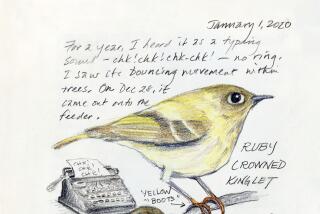Rediscoveries: ‘The Tree’ by John Fowles
Re-Discoveries
An occasional look at classic reissues…
The Tree by John Fowles with a new introduction by Barry Lopez (Ecco: 94 pp., $13.99 paper) “The key to my fiction,” wrote Fowles in 1979 when this essay was first published, “lies in my relationship with nature — I might almost have said, for reasons I will explain, in trees.” “The Tree” is part memoir, part explanation and part warning, one of the most beautiful, succinct and prescient pieces of writing we have. Fowles grew up in a suburb of London. His father was a triumphant controller of what little nature the family possessed — apple and pear trees in the backyard were lovingly pruned. During World War II, the family moved to a Devonshire village and Fowles discovered his true reverence for woods and wilderness. Our habit of naming and classifying has distanced us from nature: Nothing is more “poetically just,” he writes, than Linnaeus’ insanity before his death. It’s not so much nature that is in danger as our “attitude to it.” Nature is the source of our creativity; our relationship to it is nothing less than an art form. “The Tree” ends with a memory of Wistman’s Wood, a fragment of primeval forest, a “ur-wood” of English Oaks in Dartmoor. “My wood, my wood,” he writes, “it never shall be yours.”
.
The Mountain Lion by Jean Stafford ( New York Review Books: 240 pp., $14.95) Jean Stafford was born in Southern California, in Covina, in 1915, though much of her life was spent among the eastern literary elites. She narrowly survived marriage to Robert Lowell, then married Oliver Jensen, followed by A.J. Liebling. She wrote for the New Yorker, published three novels (“The Mountain Lion,” 1947, was her second) and won a Pulitzer nine years before she died in 1979, for her “Collected Stories.” Stafford has a dry desert style — you feel the stillness and the heat in her writing, the swish of palm trees, voices of children, the sounds of sweeping beneath walnut trees, the whir of hummingbirds. “The Mountain Lion” begins in Covina — a brother and sister, 10 and 8, have scarlet fever. They are sent, one summer, to their uncle’s ranch in Colorado, where they learn to ride and hunt and shake off some of their protective city layers. At first, they are “unable to take in the huge, snaggle-toothed mountain ranges that completely circled the valley where the ranch lay, alarmed by the rapid rushing sound of the river which they could not see, frightened by the steady commotion of animal noises.” They are vulnerable and close when they arrive but come undone. In Ralph’s hurry to become a man he inadvertently kills the things he loves. And there’s no going back. Stafford can write a real nightmare, the kind in which everything looks ominous, words cause permanent scars and a character’s one shot at happiness is dashed by his very own hands.
God on the Rocks by Jane Gardam (Europa Editions: 195 pp., $15) Jane Gardam is better known in England than America — having won or been shortlisted for just about every prestigious prize they’ve got. “God on the Rocks,” published in 1978, is set on England’s northern coast. Margaret Marsh, 8, escapes the suffocating presence of a baby brother (her mother and the newcomer are locked in a “permanent pieta”). Her blowsy New Zealand nanny takes her on day trips to the shore and for walks in the woods. It is on one of these excursions that Margaret meets Charles and his sister Binkie, once friends of her mother’s. The girl hears stories of her mother’s youth that explain not only her relationship to her parents but her very existence. Gardam’s appeal lies in part in her painterly style. It is easy to see the world through Margaret’s eyes, as a child and an adult — the ice cream, the flower beds, the crashing waves, the elderly painter at his easel. No matter how tense the family drama, Gardam adds a rich dose of stiff upper-lip humor, a bit of distance and perspective. “There’ll be a stop to all this one day,” one of Gardam’s characters meditates on servitude and class and all the traditional British baggage. “It’s another war we want.”
More to Read
The biggest entertainment stories
Get our big stories about Hollywood, film, television, music, arts, culture and more right in your inbox as soon as they publish.
You may occasionally receive promotional content from the Los Angeles Times.






